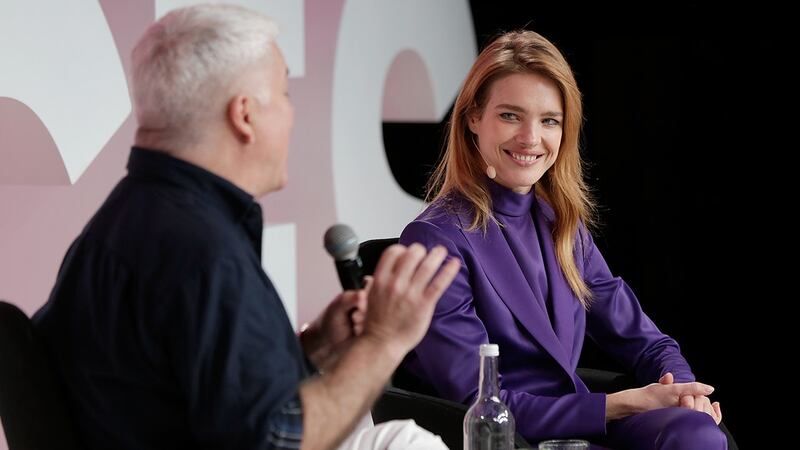
The Business of Fashion
Agenda-setting intelligence, analysis and advice for the global fashion community.

Agenda-setting intelligence, analysis and advice for the global fashion community.

The author has shared a YouTube video.
You will need to accept and consent to the use of cookies and similar technologies by our third-party partners (including: YouTube, Instagram or Twitter), in order to view embedded content in this article and others you may visit in future.
OXFORDSHIRE, United Kingdom — "I think [philanthropy] has a slightly old-fashioned feeling about it," said editor-at-large Tim Blanks at VOICES, BoF's annual gathering for big thinkers hosted in partnership with QIC Global Real Estate. "They think of huge corporations or hugely wealthy people and the people that dig deepest into their pockets are well over 50."
Perhaps no one could prove the exception to that rule so much as Natalia Vodianova, this year's recipient of BoF's Global VOICES Award, which recognises the vision to use fashion in a way that has an impact on the wider world.
"This year, for us, no one exemplified this better than Natalia Vodianova," said Imran Amed, chief executive and founder of The Business of Fashion. "From founding the Naked Heart Foundation to Elbi, the global philanthropy app for millennials, to her work as a member of the board of directors for the Special Olympics and her advocacy for the full implementation on the UN convention on the rights for persons with disabilities, Natalia has earned a global reputation as a philanthropist, digital evangelist, campaigner and fundraiser."
Inspired by the rise of "clicktivism" and online campaigns for small charities, Vodianova looked to the world of technology for her latest philanthropic venture, Elbi, which she launched in October 2015. “We all can imagine tomorrow a smart home; a smart assistant that is not even a physical person; smart living; smart shopping,” she said. “What about smart giving? And what does it look like? What does [philanthropy] mean to us today in the age of technology? And how can we scale it and react to something that is happening today?”
ADVERTISEMENT
While the primary source of fundraising for Naked Heart Foundation, which Vodianova established in Russia in 2004 to build public parks where children can play, are event tickets and donations, Elbi is accessible to those who can’t afford a $40,000-a-plate gala. Vodianova is specifically targeting socially-conscious millennials.
“The idea came from frustration,” explained Vodianova. “There are a lot of people working on doing something and we hear sporadically about it on Facebook and Instagram, but there is not one place where all those voices can be heard. If you Google how you can help a crisis, you are directed to big organisations, like Unicef and Save the Children. There are a lot of smaller charities that can probably affect change a lot faster than the bigger ones.”
What does philanthropy mean to us today in the age of technology? And how can we scale it and react to something that is happening today?
“If you are a regular person and not Bill Gates, if you don’t have much time or know who to give to and how to do it, you wouldn’t know where to donate," she added. "Even with very large organisations, if you donate your $5 or $1,000, you never know the impact you create. Elbi is a product of experience and frustration, with the aim to democratise philanthropy.”
Elbi connects users with small verified charities around the world, which are encouraged to feed back how the money has been spent and how it has changed people’s lives. At the click of the “love button,” a small donation of $1 is made to the charity via Apple Pay, or to share the charity’s profile and story with friends. Each day, new charities are presented with engaging video and written content.
The idea is for users to accumulate points from donating, which will then be converted into "Elbi coins." These can be spent in the "Elbi LoveShop" that features one-of-a-kind products from brands including Louis Vuitton, Stella McCartney, Christian Louboutin, Berluti and H&M, curated by celebrity stylist Jenke Ahmed Tailly.
“Why is it interesting for brands to be in the LoveShop? [It is] an ideal place to look for your target customer: young kids who are interested in doing good and social change and brands who are socially responsible," she said. "It’s very well known that 81 percent of younger customers are likely to swap to a brand that is more responsible and sustainable and actually affecting change.”
“It’s enhancing transparency,” noted Blanks. “They are buying products from companies whose corporate integrity they can trust. Today, young people value not only their money — they value their time.”
Related Articles:
[ Natalia Vodianova: From Fashion Fairy Tale to Philanthropic MovementOpens in new window ]
From analysis of the global fashion and beauty industries to career and personal advice, BoF’s founder and CEO, Imran Amed, will be answering your questions on Sunday, February 18, 2024 during London Fashion Week.
The State of Fashion 2024 breaks down the 10 themes that will define the industry in the year ahead.
Imran Amed reviews the most important fashion stories of the year and shares his predictions on what this means for the industry in 2024.
After three days of inspiring talks, guests closed out BoF’s gathering for big thinkers with a black tie gala followed by an intimate performance from Rita Ora — guest starring Billy Porter.